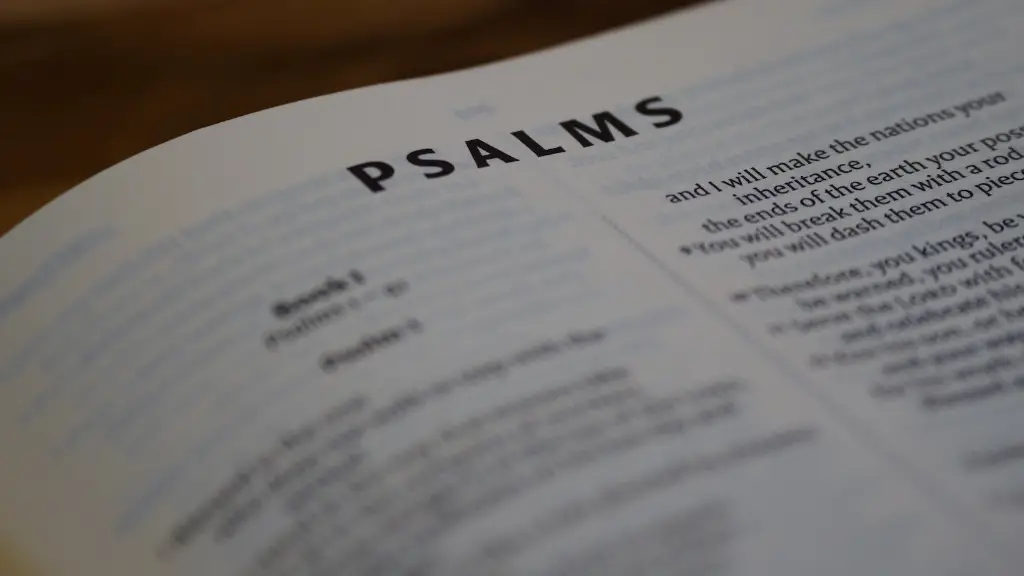Despite the popularity of prayers to the dead in many religions, the Bible is quite explicit in its warnings and instructions against engaging in any attempt to contact the departed. Praying to the dead is thought to be a way to gain access to the power of the deceased to help intercede in the living’s behalf. According to the Bible, however, this practice is forbidden. Engaging in such requests for help can only bring disastrous consequences, such as becoming enmeshed in witchcraft and demonic practices.
The Old Testament of the Bible condemns any form of contacting the dead or invoking the spirit of the deceased. In Deuteronomy 18, verses 10-12 it states, “Let no one be found among you who sacrifices their son or daughter in the fire, who practices divination or sorcery, interprets omens, engages in witchcraft, or casts spells, or who is a medium or spiritist or who consults the dead. Anyone who does these things is detestable to the Lord.” This means that in order to preserve the holiness of their covenant with God, the Israelites were forbidden from approaching the dead for counsel.
The New Testament goes further in its condemnation of the idea of contacting the dead. In Galatians 5:19-21, the apostle Paul warns Christians of the “acts of the flesh,” which include “witchcraft”– also translated as “magic arts.” As Paul states, “Those who practice such things will not inherit the kingdom of God.” This is just one more example demonstrating that there is an inherent spiritual danger involved in any attempt to reach out to the departed in prayer or any other means. The risk of demonic manipulation and possession is simply too great.
The Bible clearly reveals that the spiritual realm is constantly engaged in a great cosmic battle between the forces of good and evil. The spiritual world is powerful and mysterious, and navigating it without the guidance of the Holy Spirit is not just foolish, but potentially damned by wrong choices or deeds. As the Bible states in Isaiah 8:19-20, “When men tell you to consult mediums and spiritists, who whisper and mutter, should not a people inquire of their God? Why consult the dead on behalf of the living? Consult God’s instruction and the testimony of warning.”
In this age of increasing spiritual darkeness, it is only wise to take heed of the warnings given in the Bible: to avoid any contact with the dead, or prayers to the departed. Rather, we are to seek the Living God and trust Him alone for supernatural power, presence and guidance. As King David proclaimed in Psalm 27:14, “Wait for the Lord; be strong and take heart and wait for the Lord”.
The Bible on Communing with Demons
The Bible also makes it clear that there is a very real risk of communing with evil spirits when attempting to contact the departed. In fact, Jesus sternly warns us in Matthew 12:43-45 to recognize the danger of coming into contact with dark spirits. He states that “when an impure spirit comes out of a person, it goes through arid places seeking rest and does not find it. Then it says, I will return to the house I left. When it arrives, it finds the house unoccupied, swept clean and put in order. Then it goes and takes with it seven other spirits more wicked than itself, and they go in and live there. And the final condition of that person is worse than the first.”
Here, we discover that communing with the dead is not only forbidden and spiritually dangerous, but it can also create a doorway for demonic access into the individual’s reality and life circumstances. Inviting the dead into our lives and attempts to contact them usually leave us worse off than before, with the presence of evil spirits now connected to us.
It is for this reason that Jesus also taught us in Luke 11:5-13 that it is important to stay alert and vigilant to the schemes of the enemy, who seeks to bring destruction and ruin to God’s plans and purposes. Jesus taught us a vital lesson here: that it is much better to go to God directly in our prayers and petitions and leave the dead out of it.
The Bible on Accepting the Disciples ‘Teaching on Pray to the Dead
Not only does the Bible command us to avoid prayer to the dead, but it also instructs us to accept the teachings of the apostles on this subject. According to 2 Thessalonians 2:15, “So then, brothers and sisters, stand firm and hold fast to the teachings we passed on to you, whether by word of mouth or by letter.” This includes the apostles’ warning against speaking to the dead, since it is clearly stated in several key biblical texts that any attempt to contact the dead is an act of spiritual rebellion.
Furthermore, in 1 Corinthians 10:19-20, Paul warns the Church: “What do I imply then? That food sacrificed to idols is anything, or that an idol is anything? No, I imply that what pagans sacrifice they offer to demons and not to God. I do not want you to be participants with demons.” From this passage we can understand the danger of participating in any form of spiritual idolatry, which includes praying to the dead.
In conclusion, the Bible clearly teaches that any attempts to petition the dead are ungodly, dangerous, and forbidden. It is important to remember that God is our source of power and divine intervention, not the spirits of the dead. Therefore, in our petitions and prayers, we should remain solely dependent on God and seek Him for spiritual guidance and divine protection.
The Bible on Not Losing Faith in God
The Bible stresses the importance of placing our trust and faith in God alone. Deuteronomy 4:29-31 encourages us to seek Him when things look dark and difficult, saying, “But if from there you seek the Lord your God, you will find Him if you seek Him with all your heart and with all your soul. When you are in distress and all these things have happened to you, then in later days you will return to the Lord your God and obey Him. For the Lord your God is a merciful God; He will not abandon or destroy you or forget the covenant with your ancestors, which He confirmed to them by oath.”
God wants us to rest in Him as He reveals Himself to us and answers our call. When we acknowledge and depend on Him, we can experience the fullness of His love, grace, mercy and protection. Therefore, any attempts to replace Him in our lives or to bring other entities into the equation is a humbling reminder that He is all that we need. He is sovereign and capable of removing all obstacles in our path, dissolving all darkness and shielding us from all ungodly influences.
The prophet Jeremiah conveys the Lord’s promise in Jeremiah 17:7-8: “But blessed is the one who trusts in the Lord, whose confidence is in Him. They will be like a tree planted by the water that sends out its roots by the stream. It does not fear when heat comes; its leaves are always green. It has no worries in a year of drought and never fails to bear fruit.”
The Bible on Connecting to Heaven
The Bible also reminds us of the importance of reaching out to Heaven and remaining open to greater levels of divine revelation. This is a reminder that God is the only source of true knowledge and insight, and the only one worthy of our full devotion. As Jesus says in John 14:16-18, “And I will ask the Father, and He will give you another Helper, that He may be with you forever; that is the Spirit of truth, whom the world cannot receive, because it does not see Him or know Him, but you know Him because He abides with you and will be in you. I will not leave you as orphans; I will come to you.”
God desires a deeper relationship with us, and He longs to reveal His plans and purposes to us. Furthermore, He wants us to develop a meaningful connection with Heaven, which extends beyond the grave. As Philippians 3:20-21 states, “Our citizenship is in heaven…And we eagerly await a Savior from there, the Lord Jesus Christ, who, by the power that enables Him to bring everything under His control, will transform our lowly bodies so that they will be like His glorious body.”
God wants us to draw near to Him, not to the dead. He desires to empower us to live an abundant life and release us into supernatural realms of divine love, grace and peace. When we submit to His plans, He can guide our hearts and steer us toward the ultimate destination—His glorious kingdom.
The Bible on Remembering the Dead
Although we are warned to avoid praying to the dead, the Bible still encourages us to remember and honor them. In Proverbs 10:7, we read, “The memory of the righteous is a blessing, but the name of the wicked will rot.” In other words, we should keep the good deeds of the righteous in mind, and commemorate the memory of their lives with honor and respect.
In Ecclesiastes 8:1-2, the Bible puts it this way: “Whoever keeps the commandment will experience nothing harmful, and a wise heart knows the proper time and procedure. For there is a proper time and procedure for every matter, though a person’s misery weighs heavily on them.” This passage reminds us that we should keep our sorrows in check, even as we remember and honor the dead.
We can also discover comfort in knowing that, although the relationship may have been severed in the physical realm, death does not separate us from loved ones in the spiritual realm. As Jesus stated in Luke 16:19-31, “And besides all this, between us and you a great chasm has been fixed, so that those who want to go from here to you cannot, nor can anyone cross over from there to us.” This passage tells us that, although there is a great gulf between the living and the dead, God has plans to reunite us with our loved ones on the Other Side.
The Bible on Turning to God
The Bible teaches that we should turn to God in all things, especially in times of sorrow and grief. As stated in Psalm 34:17-18, “The righteous cry out, and the Lord hears them; He delivers them from all their troubles. The Lord is close to the brokenhearted and saves those who are crushed in spirit.”
In difficult times, it is vital to remember that God is Greater than any trial or tribulation. He alone can bring true peace and healing to our hearts and restore our relationship with our loved ones. We can trust in the Lord’s promise found in Romans 8:28: “And we know that in all things God works for the good of those who love





